AWM41 1008 - [Nurses Narratives] Staff-Nurse J M Mathews - Part 1
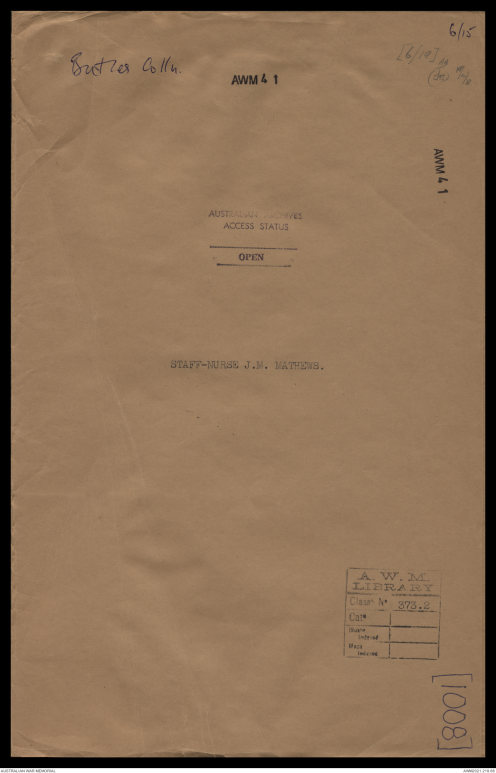
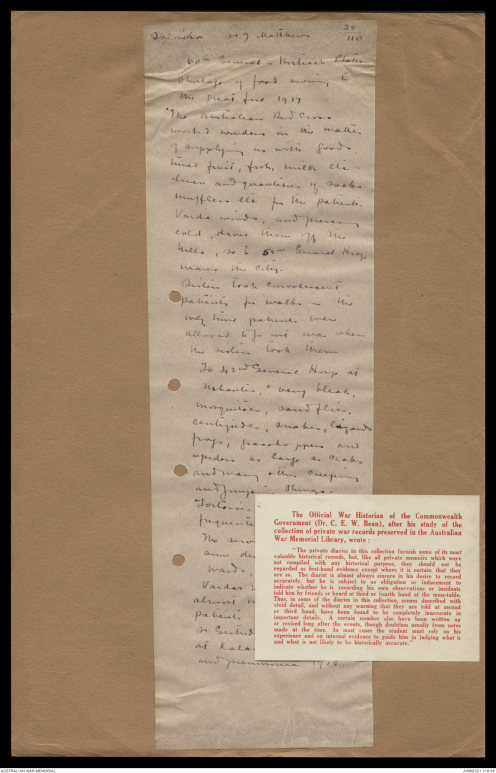
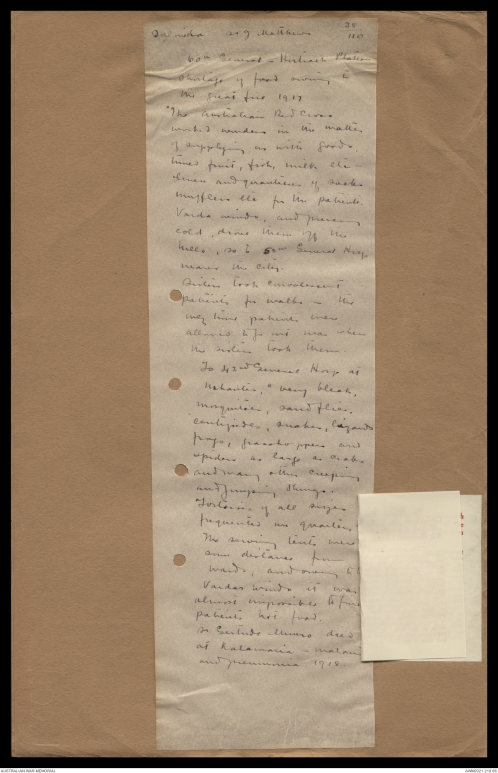
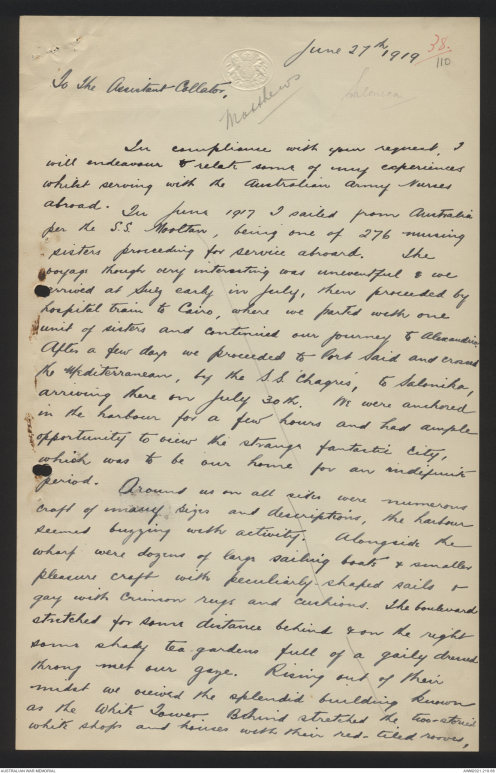
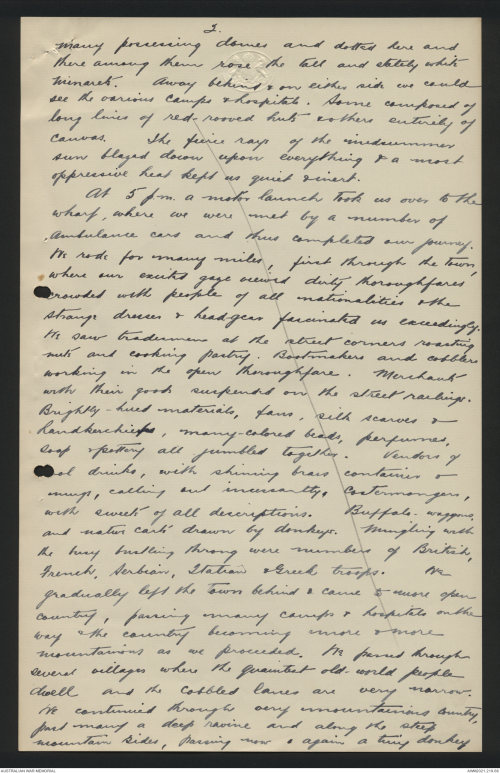
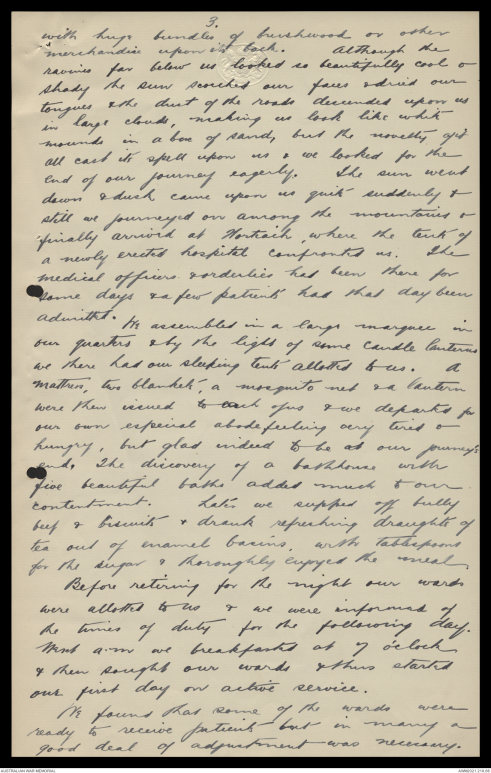
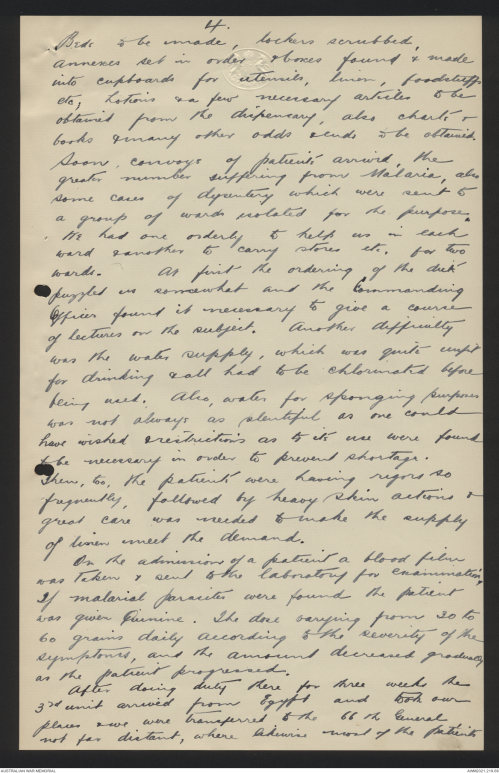
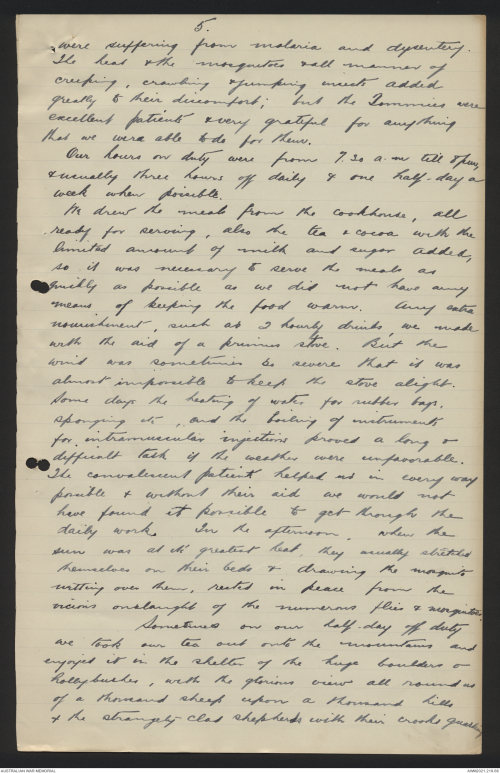
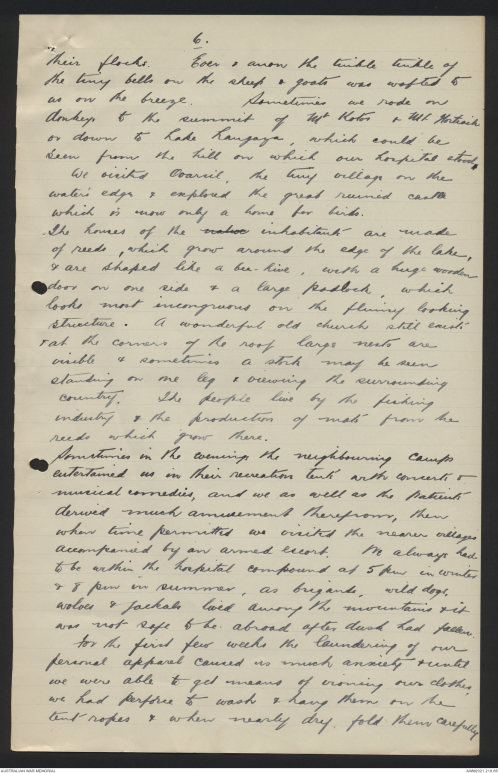
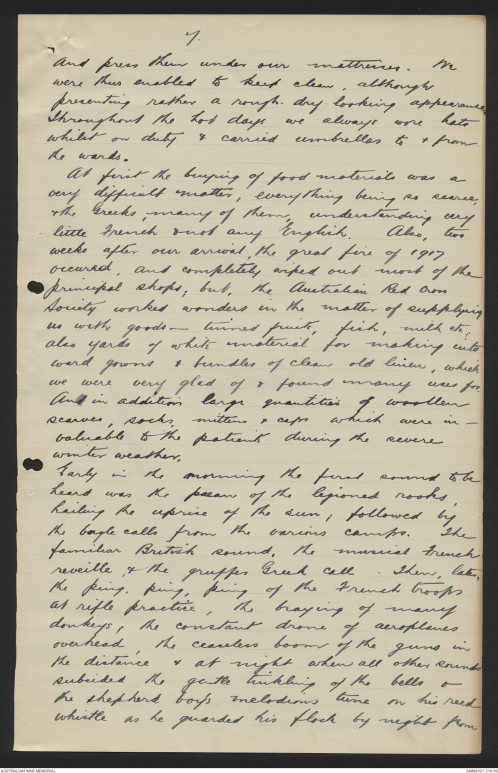
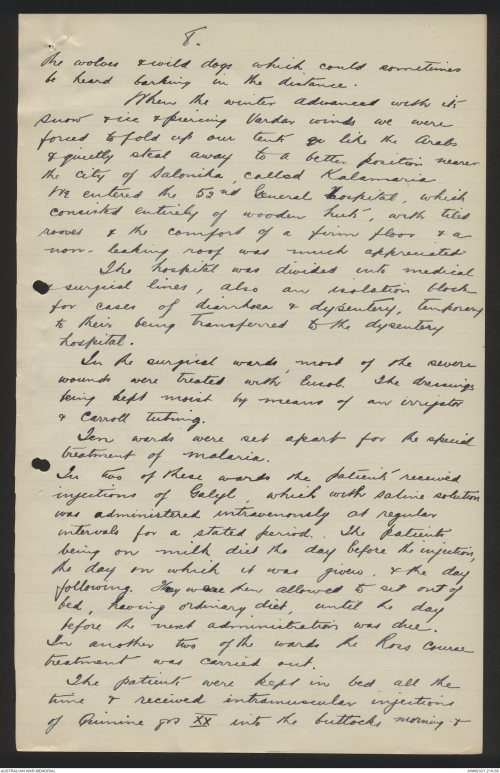
6/15
Butler Colln
[6/18]
[[?]]
AWM41
AWM41
AUSTRALIAN ARCHIVES
ACCESS STATUS
OPEN
STAFF-NURSE J.M. MATHEWS
A.W.M.
LIBRARY
Class No 373.2
Salonika N J Matthews 38/[?]
60th General -Hospital Platoon
shortage of food owing to
the great fire 1917
"The Australian Red Cross
worked wonders in this matter
of supplying us with goods,
tinned fruit, fish, milk, etc-
linen and quantities of socks
mufflers etc for the patients.
Varda winds, and pressing
cold, drove them off the
hills, so [[?]] 52nd General Hosp
nearer the city.
Sisters took [[convalescent?]]
patients for walks - - the
only time patients were
allowed to go out was when
the sisters took them.
To 42nd General Hosp at
[[?]] , " very bleak,
mosquitoes, sand flies,
centipedes, snakes, lizards
frogs, grasshoppers and
spiders as large as crabs
and many other creeping
and jumping things.
Tortoises
frequently
[*The Official War Historian of the Commonwealth
Government (Dr. C.E.W. Bean), after his study of the
collection of private war records preserved in the Australian
War Memorial Library, wrote:
"The private diaries in this collection furnish some of its most
valuable historical records, but, like all private memoirs which were
not compiled with any historical purpose, they should not be
regarded as first-hand evidence except where it is certain that they
are so. The diarist is almost always sincere in his desire to record
accurately, but he is subject to no obligation or inducement to
indicate whether he is recording his own observations or incidents
told him by friends or heard at third or fourth hand at the mess table.
Then, in some of the diaries in this collection, scenes described with
vivid detail, and without any warning that they are told at second
or third hand, have been found to be completely inaccurate in
important details. A certain number also have been written up
or revised long after the events, through documents usually from notes
made at the time. In most cases the student must rely on his
experience and on internal evidence to guide him in judging what is
and what is not likely to be historically accurate".*]
frequent
No [[?]]
[[?]]
ward.
[[Vardas?]]
almost
patients
[[?]]
at [[Kata?]]
and pneumonia 1918.
Salonika N J Matthews 38/[[110?]]
60th General -Hospital Platoon
shortage of food owing to
the great fire 1917
"The Australian Red Cross
worked wonders in this matter
of supplying us with goods,
tinned fruit, fish, milk, etc-
linen and quantities of socks
mufflers etc for the patients.
Varda winds, and pressing
cold, drove them off the
hills, so [[?]] 52nd General Hosp
nearer the city.
Sisters took [[convalescent?]]
patients for walks - - the
only time patients were
allowed to go out was when
the sisters took them.
To 42nd General Hosp at
[[Maha?]] , " very bleak,
mosquitoes, sand flies,
centipedes, snakes, lizards
frogs, grasshoppers and
spiders as large as crabs
and many other creeping
and jumping things.
Tortoises of all sizes
frequented our quarters.
No serving tents were
some distances from
wards, and owing to the
Varda winds it was
almost impossible to find
patients hot food
Sr Gertrude Munro died
of Kalamaria - malaria
and pneumonia 1918.
June 27th 1919
38/110.
To the Assistant Collator,
[*Matthews ] [Salonica*]
In compliance with your request, I
will endeavour to relate some of my experiences
whilst serving with the Australian Army Nurses
abroad.
In June 1917 I sailed from Australia
per the S.S. Mooltan, being one of 276 nursing
sisters proceeding for service abroad. The
voyage though very interesting was uneventful & we
arrived at Suez early in July, then proceeded by
hospital train to Cairo, where we parted with one
unit of sisters and continued our journey to Alexandria.
After a few days we proceeded to Port Said and crossed
the Mediterranean, by the S.S. "Chagres", to Salonika,
arriving there on July 30th. We were anchored
in the harbour for a few hours and had ample
opportunity to view the strange fantastic city,
which was to be our home for an indefinite
period.
Around us on all sides were numerous
craft of many sizes and descriptions, the harbour
seemed buzzing with activity. Alongside the
wharf were dozens of large sailing boats & smaller
pleasure craft with peculiarly shaped sails &
gay with crimson rugs and cushions. The boulevard
stretched for some distance behind & on the right
some shady tea gardens full of a gaily dressed
throng met our gaze. Rising out of their
midst we observed the splendid building known
as the White Tower. Behind stretched the two-storied
white shops and houses with their red-tiled rooves,
2.
many possessing domes and dotted here and
there among them rose the tall and stately white
minarets. Away behind & on either side we could
see the various camps & hospitals. Some composed of
long lines of red-rooved huts & others entirely of
canvas. The fierce rays of the midsummer
sun blazed down upon everything & a most
oppressive heat kept us quiet & inert.
At 5 p.m. a motor launch took us over to the
wharf, where we were met by a number of
ambulance cars and thus completed our journey.
We rode for many miles, first through the town,
where our excited gaze viewed dirty thoroughfares
crowded with people of all nationalities & the
strange dresses & headgear fascinated us exceedingly.
We saw tradesmen at the street corners roasting
nuts and cooking pastry. Bootmakers and cobblers
working in the open thoroughfare. Merchants
with their goods suspended on the street railings.
Brightly hued materials, fans, silk scarves &
handkerchiefs, many-colored beads, perfumes,
soap & pottery all jumbled together. Vendors of
cool drinks, with shining brass containers &
mugs, calling out incessantly, costermongers,
with sweets of all descriptions. Buffalo waggons,
and native carts drawn by donkeys. Mingling with
the busy bustling throng were numbers of British,
French, Serbian, Italian and Greek troops. We
gradually left the town behind and & came to more open
country, passing many camps and hospitals on the
way & the country becoming more and more
mountainous as we proceeded. We passed through
several villages where the quaintest old world people
dwell and the cobbled lanes are very narrow.
We continued though very mountainous country,
past many a deep ravine and along the steep
mountain sides, passing now & again a tiny donkey
3.
with huge bundles of brushwood or other
merchandise upon its back. Although the
ravines far below us looked so beautifully cool &
shady the sun scorched our faces and dried our
tongues & the dust of the roads descended upon us
in large clouds, making us look like white
mounds in a box of sand, but the novelty of it
all cast its spell upon us & we looked for the
end of our journey eagerly. The sun went
down and dusk came upon us quite suddenly &
still we journeyed on among the mountains &
finally arrived at [[Nortraih]], where the tents of
a newly erected hospital confronted us. The
medical officers & orderlies had been there for
some days & a few patients had that day been
admitted.
We assembled in a large marquee in
our quarters & by the lights of some candle lanterns
we there had our sleeping tents allotted to us. A
mattress, two blankets, a mosquito net & a lantern
were then issued to each of us & we departed for
our own especial abode feeling very tired &
hungry, but glad indeed to be at our journey's
end. The discovery of a bathhouse with
five beautiful baths added much to our
contentment. Later we supped off bully
beef & biscuits & drank refreshing draughts of
tea out of enamel basins, with tablespoons
for the sugar & thoroughly enjoyed the meal.
Before retiring for the night our wards
were allotted to us & we were informed of
the times of duty for the following day.
Next a.m. we breakfasted at 7 o'clock
and then sought our wards & thus started
our first day on active service.
We found that some of the wards were
ready to receive patients but in many a
good deal of adjustment was necessary.
4.
Beds to be made, lockers scrubbed,
annexes set in order & boxes found & made
into cupboards for utensils, linen, foodstuffs,
etc, Lotions & a few necessary articles to be
obtained from the dispensary, also charts &
books & many other odds & ends to be obtained.
Soon, convoys of patients arrived, the
greater number suffering from Malaria, also
some cases of Dysentery which were sent to
a group of wards isolated for the purpose.
We had one orderly to help us in each
ward & another to carry stores etc. for two
wards. At first the ordering of the deck
puzzled us somewhat and the Commanding
Officer found it necessary to give a course
of lectures on the subject. Another difficulty
was the water supply, which was quite unfit
for drinking and all had to be chlorinated before
being used. Also, water for sponging purposes
was not always as plentiful as one could
have wished & restrictions as to its use were found
to be necessary in order to prevent shortage.
Then, too, the patients were having rigors so
frequently, followed by heavy skin actions &
great care was needed to make the supply
of linen meet the demand.
On the admission of a patient a blood film
was taken & sent to the laboratory for examination.
If malarial parasites were found the patient
was given Quinine. The dose varying from 30 to
60 grams daily according to the severity of the
symptoms, and the amount decreased gradually
as the patient progressed.
After doing duty there for three weeks the
3rd unit arrived from Egypt and took our
places & we were transferred to the 66th General
not far distant, where likewise most of the patients
5.
were suffering from malaria and dysentery.
The heat and the mosquitoes and all manner of
creeping, crawling and jumping insects added
greatly to their discomfort ; but the Tommies were
excellent patients and very grateful for anything
that we were able to do for them.
Our hours on duty were from 7.30a.m till 8pm,
and usually three hours off daily and one half-day a
week when possible.
We drew the meals from the cookhouse, all
ready for serving, also the tea and cocoa with the
limited amount of milk and sugar added,
so it was necessary to serve the meals as
quickly as possible as we did not have any
means of keeping the food warm. Any extra
nourishment, such as 2 hourly drinks, we made
with the aid of a primus stove. But the
wind was sometimes so severe that it was
almost impossible to keep the stove alight.
Some days the heating of water for rubber bags,
sponging etc, and the boiling of instruments
for intramuscular injections proved a long and
difficult task if the weather were unfavorable.
The convalescent patients helped out in every way
possible and without their aid we would not
have found it possible to get through the
daily work. In the afternoon, when the
sun was at its greatest heat, they usually stretched
themselves on their beds and drawing the mosquito
netting over them, rested in peace from the
vicious onslaught of the numerous flies & mosquitoes.
Sometimes on our half-day off duty
we took our tea out onto the mountains and
enjoyed it in the shelter of the huge boulders or
holly bushes, with the glorious view all round us
of a thousand sheep upon a thousand hills
and the strangely-clad shepherds with their crooks guarding
6.
their flocks. Even & [[morn?]] the tinkle tinkle of
the tiny bells on the sheep and goats was wafted to
us on the breeze. Sometimes we rode on
donkeys to the summit of Mt Kotor and Mt [[Nortaich?]]
or down to Lake [[Laugaya?]], which could be
seen from the hill on which our hospital stood.
We visited [[Coarcil?]], the tiny village on the
water's edge and explored the great ruined castle
which is now only a home for birds.
The homes of the [[native?]] inhabitants are made
of reeds, which grow around the edge of the lake,
and are shaped like a bee-hive, with a huge wooden
door on one side and a large padlock, which
looks most incongruous on the flimsy looking
structure. A wonderful old church still exists
and at the corners of roof large nests are
visible and sometimes a stork may be seen
standing on one leg and viewing the surrounding
country. The people live by the fishing
industry & the production of mats from the
reeds which grow there.
Sometimes in the evenings the neighbouring camps
entertained us in their recreation tent with concerts &
musical comedies, and we as well as the patients
derived much amusement therefrom, then
when time permitted we visited the nearer villages
accompanied by an armed escort. We always had
to be within the hospital compound at 5 pm in winter
and 8 pm in summer, as brigands, wild dogs,
wolves and jackals lived among the mountains and it
was not safe to be abroad after dusk had fallen.
For the first few weeks the laundering of our
personal apparel caused us much anxiety & until
we were able to get means of ironing our clothes
we had perforce to wash and hang them on the
tent ropes and when nearly dry fold them carefully
7.
and press them under our mattresses. We
were thus enabled to keep clean, although
presenting rather a rough dry looking appearance.
Throughout the hot days we always wore hats
whilst on duty and carried umbrellas to & from
the wards.
At first the buying of food material was a
very difficult matter, everything being so scarce
and the Greeks, many of them, understanding very
little French and not any English. Also, two
weeks after our arrival, the great fire of 1917
occurred, and completely wiped out most of the
principal shops; but the Australian Red Cross
Society worked wonders in the matter of supplying
us with goods -tinned fruits, fish, milk etc,
also yards of white material for making into
ward gowns and bundles of clean old linen, which
we were very glad of and found many uses for.
And in addition larger quantities of woollen
scarves, socks, mittens and caps which were
invaluable to the patients during the severe
winter weather.
Early in the morning the first sound to be
heard was the paean of the legioned rooks,
hailing the uprise of the sun, followed by
the bugle calls from the various camps. The
familiar British sound, the musical French
reveille, & the gruffer Greek call. Then, late,
the ping, ping, ping of the French troops
at rifle practice, the braying of many
donkeys, the constant drone of aeroplanes
overhead, the ceaseless boom of the guns in
the distance and at night when all other sounds
subsided the gentle tinkling of the bells and
the shepherd boy's melodious tunes in his reed
whistle as he guarded his flock by night from
8.
the wolves & wild dogs which could sometimes
be heard barking in the distance.
When the winter advanced with its
snow and ice and piercing Vardar winds we were
forced to fold up our tents ge like the Arabs
& quietly steal away to a better position nearer
the city of Salonika, called Kalamaria.
We entered the 52nd General Hospital, which
consisted entirely of wooden huts, with tiled
rooves and the comfort of a firm floor & a
non-leaking roof was much appreciated.
The hospital was divided into medical
& surgical lines, also an isolation block
for cases of diarrhoea & dysentery, temporary
to their being transferred to the dysentery hospital.
In the surgical wards most of the severe
wounds were treated with Eusol. The dressings
being kept moist by means of an irrigator
and Carroll tubing.
Ten wards were set apart for the special
treatment of malaria.
In two of these wards the patients received
injections of Galyl, which with saline solution
was administered intravenously at regular
intervals for a stated period. The patients
being on milk diet the day before the injection,
the day on which it was given, & the day
following. They were then allowed to sit out of
bed, having ordinary diet, until the day
before the next administration was due.
In another two of the wards the Ross course
treatment was carried out.
The patients were kept in bed all the
time and received intramuscular injections
of Quinine gr XX into the buttocks, morning &
 Sam scott
Sam scottThis transcription item is now locked to you for editing. To release the lock either Save your changes or Cancel.
This lock will be automatically released after 60 minutes of inactivity.